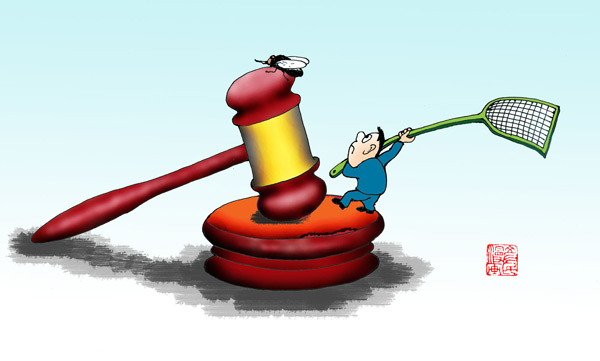


Cartoon by Wang Yanmin [cartoon.chinadaily.com.cn]
Rulings must not be influenced by money, administrative power or relationships
China's top court has ordered the nation's courts to be independent of and resist pressure from local governments and other departments.
A statement published by the Supreme People's Court on Monday said court rulings must not be influenced by factors such as administrative power, money and relationships, to ensure the courts maintain their independence and ability to be just.
All judges in the country handle cases in line with laws, while superior courts must support lower courts' judgments without interference, the statement said.
"Judges must strictly abide by laws in handling cases and cannot break these laws for any reason," said Hu Yunteng, director of the research department under the top court.
"Dealing with cases under laws can boost judicial credibility, which is not a slogan," Hu said. "In today's society, people also want us to remove obstacles before giving judgments."
In response to several wrongful-judgment scandals, the statement also requires each court to improve its accountability mechanism.
In one high-profile case, Zhang Hui and his uncle, Zhang Gaoping, both residents of Zhejiang province, were sentenced to death and life in prison in 2004 for allegedly raping a 17-year-old girl.
The sentences were later reduced to death with two years' probation for Zhang Hui and a 15-year prison term for Zhang Gaoping in the second trial.
But in March, the two were acquitted of rape after a retrial found insufficient evidence to prove their guilt.
The top court will also publish a guideline soon on preventing unjust, wrongful and false cases, Hu added.
Liu Li, a judge specializing in foreign cases with Beijing Chaoyang District People's Court, welcomed the statement, saying independent adjudication is a way to improve judicial authority and justice.
She said some judges are indeed influenced before handing down their verdicts, especially when a few people provide them with benefits or disturb their trials.
"The simplest way to eliminate interference is to strictly abide by laws, even if people cry or bang their heads in the courtrooms," she said.
An independent adjudication is a key to boost quality of judicial work and avoid unjust, false and erroneous cases, she added.
However, Guo Jie, a court officer in Sanming, Fujian province, still has concerns about how the statement will be enforced.
"Judges in remote areas are easily affected when handling some administrative cases because sometimes our work needs the support of local government and big enterprises," she said.
For this reason, she said, it is hard to say that all judgments, especially in land disputes, are handled fairly, adding that the accountability mechanism also pressured judges at times.
Yang Weidong, a law professor at the Chinese Academy of Governance, echoed Guo's comments, saying independent adjudication is a big job that not only needs judges' efforts, but that of other departments as well.
"Now, courts' funds are from local public financing, which may affect judicial justice to some extent," he said. "How to separate the two is important to get independent judgments."
Also, superior courts should respect lower courts' verdicts instead of influencing them, he suggested.
In addition, judges who willfully hand down unjust judgments or make wrongful and false cases should be seriously punished, he added.